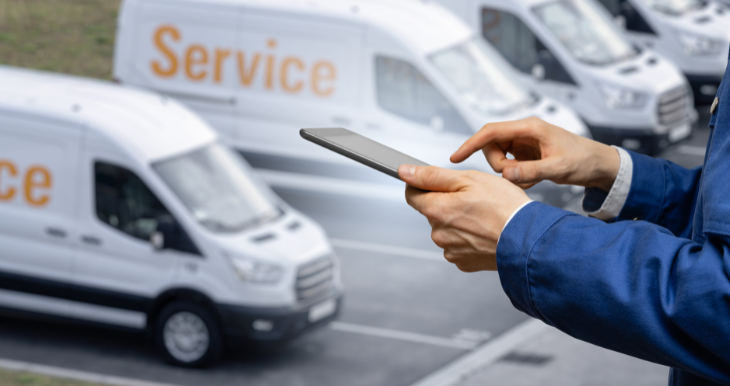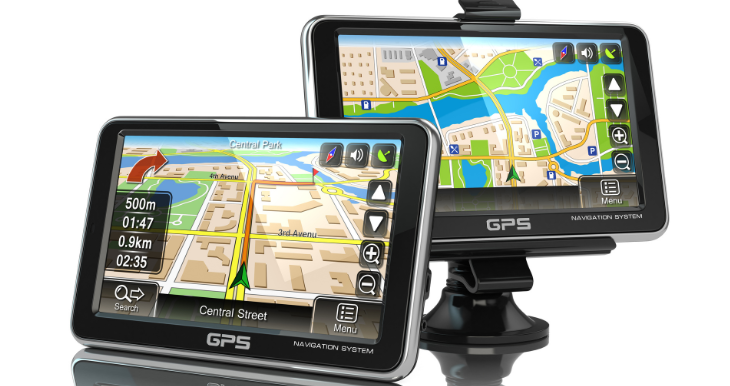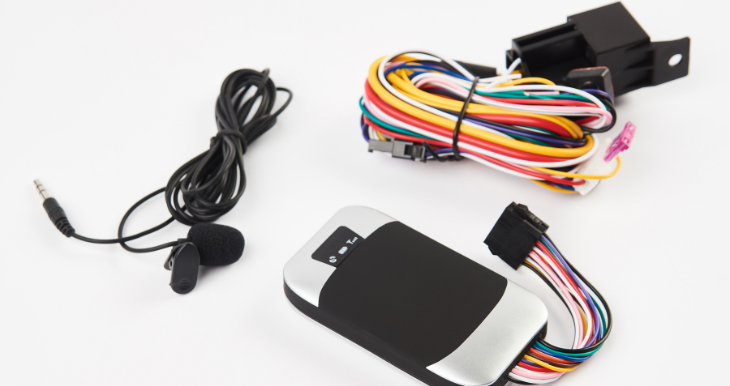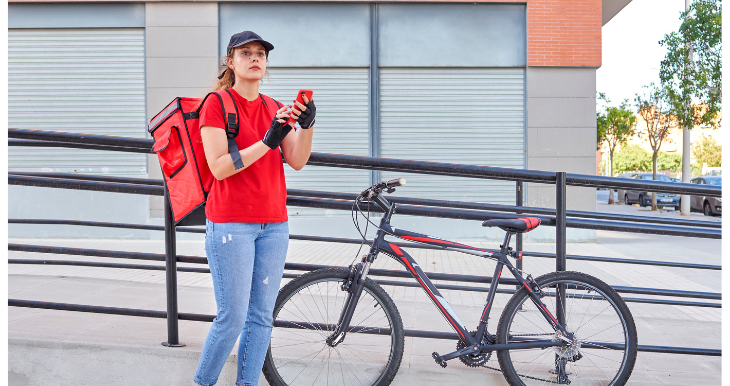Answer these simple questions and we will find you the BEST prices
Which type of solar quotes do you need?
It only takes 30 seconds
100% free with no obligation

Get up to 4 quotes from our selected suppliers by filling in only 1 form

Save money by comparing quotes and choosing the most competitive offer

Our service is 100% free and with no obligation
- Market-Inspector.co.uk
- Vehicle Tracking
- Vehicle Tracking Installation
Your Go-To Vehicle Tracking Installation Guide


- Depending on your business needs, you can opt for a plug-and-play device tracking installation or a hardwired device, which is directly connected to the vehicle's engine system.
- Many companies that offer vehicle tracking also provide installation services. This means a trained technician will come to install everything at a place and time that works best for your business.
- Installing tracking devices in multiple vehicles at once can often reduce the cost per unit for professional installation. This is because service providers may offer bulk discounts as an incentive for larger orders.
Implementing a vehicle tracking system is a significant step towards enhancing the operational efficiency and security of your business fleet.
This tracker installation guide outlines the essential considerations and steps involved in selecting and installing the right tracking system for a variety of vehicles, specifically cars, vans, trucks, motorcycles, and bicycles.
Understanding the basics of tracker fitting, specific considerations by vehicle type, and the advantages of professional over DIY installations can help you make informed decisions that bolster your business’s efficiency and security. Read on to find out more about how to fit a tracker to a car and other vehicles, and the overall benefits of these systems.
- Describe your needs
- Get free quotes
- Choose the best offer
It only takes 30 seconds

The basics of tracker fitting
The initial step to tracker fitting involves accessing your business’s needs. You need to evaluate the type of vehicle to be fitted, the specific requirements of the tracking device, and whether the installation will be undertaken through a DIY method or by a professional.
Initially, it is essential to determine the type of device you employ, whether it be hardwired or plug-and-play devices.
We will take a look at two distinct scenarios to illustrate the wide range of complexities associated with installing vehicle tracking systems. By examining these contrasting cases, we aim to understand the installation process for vehicle tracking technologies.
Easy-to-install scenario
For an easy installation, you can consider plug-and-play devices for your business. These devices require no intricate installation procedures. Simply connect these devices to your vehicle and you are good to go.
Some device models are compatible with the cigarette lighter socket, whereas the majority are designed to interface seamlessly with the OBD (On-Board Diagnostics) port, often referred to as OBD devices. The simplicity, speed, and cost-effectiveness of installing these devices are unparalleled.
Imagine that you operate a local florist business that needs to keep track of its delivery vans. A simple plug-and-play GPS tracker that fits into the vehicle's OBD-II port can be an ideal solution.
These devices require no special tools for installation, making them perfect for business owners looking to avoid additional installation costs.

Complex installation case
Consider a logistics company that operates a fleet of large trucks across international borders. Such vehicles not only require GPS tracking for location but also need to monitor fuel consumption, driver behaviour, and cargo temperature.
For these purposes, a more sophisticated tracking system that integrates with the vehicle’s onboard diagnostics and requires a hardwired connection to the vehicle's power supply is necessary.
This type of installation is complex and typically requires the expertise of a professional to ensure the system is integrated correctly and securely.
Unlike plug-and-play devices, hardwired devices necessitate a more involved installation process, as they must be directly connected to the vehicle's engine system.
This approach ensures that the devices are correctly integrated with the vehicle's systems, providing reliable and continuous service.

Tracking device installation by vehicle
The process and considerations for installing tracking devices vary significantly across different types of vehicles. This section explores these nuances to guide business owners in making informed decisions.
We will delve into the different types of vehicles - cars, vans, trucks, motorcycles, and bikes - as well as the tracker installation steps. These steps include choosing a suitable installation spot in the vehicle, connecting the tracker and testing it.
We will also look at the associated costs and how these can impact your business.
For cars
A car tracker installation cost varies widely based on several factors such as the ease of installation, the stealthiness of the device placement, and the compatibility of the tracking system with the vehicle's onboard diagnostics.
Installation steps
- Selecting the installation spot: Common areas include under the dashboard for hardwired systems or the OBD-II port for plug-and-play devices. The goal is to ensure the tracker is hidden from view to prevent tampering.
- Connecting the tracker: For hardwired systems, this involves connecting the device directly to the car's power supply, requiring some knowledge of the vehicle's electrical system. For OBD-II devices, it simply means plugging the tracker into the port.
- Securing and testing: Once connected, secure the device in place, then test to ensure it's operational and transmitting data accurately.
The cost of professional installation can range from £50 to £150 per vehicle. This price can often be reduced on a per-unit basis when installing trackers in multiple vehicles at once. This is generally a one-time fee, but it's important to consider the ongoing costs of the tracking service subscription.
The cost per unit for installing trackers in cars can become more affordable as the number of vehicles requiring installation increases.
This pricing structure means that businesses with a larger number of car trackers fitted can benefit from making this overall investment as it is more cost-effective per vehicle.

For vans
Vans offer more hiding spots for trackers, which can be advantageous for stealth - making the tracker less detectable. However, the variety in van models and their uses means installation can vary.
Installation steps
- Choosing the location: Look for a spot that is not only discreet but also protects the device from potential damage due to cargo load or movement.
- Power connection: Similar to cars, vans can use either hardwired connections or OBD-II port connections, depending on the tracker type.
- Device testing: Ensure the tracker is fully operational and the location provides optimal signal transmission.
Due to the slightly increased complexity and the potential need for custom solutions in vans, the cost might be slightly higher than that for cars, but the principle of bulk discounts for multiple installations still applies.
The cost per unit for installing trackers can become more affordable as the number of vehicles requiring installation increases.
This pricing structure means that businesses outfitting a larger fleet with tracking devices can benefit from reduced rates per tracker, making it a cost-effective solution for larger operations.

For trucks
Trucks require durable and sophisticated tracking systems to withstand the rigours of long hauls and variable weather conditions. Tracking systems may also need to interface with logistics and fleet management software.
Installation steps
- Integration points: Selecting a location that doesn't interfere with the truck's operational mechanisms is crucial. It must also be accessible for maintenance.
- Complex connections: Given the size and complexity of trucks, the electrical integration can be more involved, possibly requiring professional expertise to ensure the system is not only powered but also fully integrated with the vehicle's telematics systems.
- Functional verification: Testing in trucks might involve not just location tracking but also additional functionalities such as fuel monitoring and temperature control for refrigerated compartments.
The cost for professional installation in trucks starts from £100, reflecting the increased complexity and the potential need for specialised equipment or integration. It is important to note that the price per unit can decrease depending on the number of vehicles where a tracker needs to be fitted.

For motorcycles
Motorcycles present unique challenges for tracker installation, including limited space for placement and exposure to the elements. Stealth and protection from theft are paramount.
Installation steps
- Securing the tracker: Finding a covert location that offers protection from weather and road grime is essential. Under the seat or within the fairing are common choices.
- Electrical connection: Connecting the tracker to the motorcycle's battery requires careful planning to ensure the device remains powered without draining the battery.
- Operational testing: Due to the exposed nature of motorcycles, testing to confirm the tracker remains functional in various weather conditions is critical.
The installation cost can vary but generally starts around £75, depending on the number of motorcycles that need the tracker, the complexity of the motorcycle and the chosen tracker system.

For bikes
For bicycles, the primary concerns are the tracker's visibility to potential thieves and its weather resistance. Since bikes don't have a power source, trackers need to be battery-operated and compact.
Installation steps
- Placement: Finding a discreet yet secure location on the bike, such as within the frame or under the seat, is crucial.
- Mounting the tracker: Some trackers are designed with bike mounts, while others may require creative solutions to ensure they are securely attached and remain hidden.
- Activation and testing: Ensuring the tracker is active and properly transmitting data is the final step, with particular attention paid to battery life and signal strength.
Regarding pricing, installation costs are generally lower for bikes, but professional installation can ensure the tracker is both effectively hidden and securely attached. Costs vary based on the tracker model, installation complexity, and the number of bicycles that need trackers.

DIY vs professional tracker installation
When searching for a car tracker installation business, opting for a DIY installation can be tempting, especially for small businesses looking to minimise costs. However, the complexities involved in ensuring a tracker is not only installed correctly but also optimally positioned for accurate data transmission make professional installation the preferred choice for most business owners.
The initial higher cost pays off in the long run through the reliability and efficiency of the tracking system, with the added benefit of professional advice on the best tracker types and installation methods for your specific vehicle types.
Professionals can also offer warranties on their work, providing peace of mind that the tracking system will function as intended. This, coupled with the potential insurance benefits and the operational efficiencies gained from a well-integrated tracking system, often makes the choice for professional installation a clear one.
Installing a tracker in your vehicle can often reduce insurance premiums because insurance companies see it as an additional security measure, lowering the risk of theft. The size of the discount may vary by provider and the details of the tracking system. It’s recommended to check with your insurance company to see how a tracker could impact your premiums.
For those who prefer the hands-on approach, some manufacturers, like Verizon Connect, offer tracking devices tailored for easy self-installation in smaller fleets. This option allows you immediate implementation without waiting for a technician, enabling swift activation of your vehicle tracking capabilities.
Conversely, owners of larger fleets or those uncertain about installing tracking devices themselves should consider professional installation services.
Many vehicle tracking providers in the UK offer comprehensive installation services, which include having a certified technician perform the setup at a convenient location and time for your business. If your chosen provider does not offer such services, third-party professional installers are also an option, ensuring your fleet is equipped without any hassle.
This route guarantees expert installation and peace of mind, allowing you to focus on running your business efficiently.
Tracking regulations and benefits
In the UK, installing a tracker on a vehicle you own is legal, but you must adhere to privacy laws, particularly in business scenarios involving tracking employees' vehicles. You must inform employees about trackers and explain their use, complying with the Data Protection Act and GDPR, which demand lawful, fair, and transparent handling of personal data, including location tracking.
For businesses that depend significantly on vehicle fleets, investing in a fitted tracker is often a beneficial decision. Trackers bring a host of advantages, such as increased security, better fleet management, and possible reductions in insurance premiums.
They enable the real-time tracking of vehicles, leading to improved operational efficiency, lowered fuel expenses, and enhanced customer satisfaction through precise arrival time predictions. Furthermore, in cases of theft, having a tracker greatly boosts the likelihood of retrieving the stolen vehicle. The collective gains from enhanced security, operational efficiency, and cost savings underscore the value of investing in a tracking system.
Begin obtaining customised estimates now to steer your fleet towards enhanced productivity and cost reduction.
- Describe your needs
- Get free quotes
- Choose the best offer
It only takes 30 seconds

FAQ
Yes, in many cases, installing a tracker in your vehicle can lead to reduced insurance premiums. Insurance companies often view the addition of a tracking device as an extra layer of security, which can lower the risk of theft.
As a result, they may offer discounts on insurance premiums for vehicles equipped with tracking systems.
A car tracker installation cost varies widely based on several factors, including the type of tracker, the complexity of the installation, and whether the installation is done professionally or as a DIY project.
For a basic plug-and-play tracker, the cost might be as low as £50 to £100, with the device itself being relatively inexpensive and easy to install without professional help. More sophisticated systems that require hardwiring can cost upwards of £150 to £300 for professional installation.
This price typically includes the cost of the tracker and the labour but does not cover the ongoing subscription fees for the tracking service, which can vary from £10 to £30 per month.
Yes, installing a tracking device on a vehicle you own in the UK is legal. However, there are privacy laws and regulations that you must consider, especially in a business context where you’re tracking vehicles used by employees.
It’s essential to ensure that employees are informed about the presence of trackers in their vehicles and understand the purpose behind their use. The Data Protection Act and the General Data Protection Regulation, GDPR, stipulate that the use of personal data, including location tracking, must be lawful, fair, and transparent.
For most businesses, especially those that rely heavily on vehicle fleets, having a fitted tracker is worth the investment.
Trackers offer numerous benefits, including improved security, enhanced fleet management capabilities, and potential insurance savings. They allow for real-time monitoring of vehicle locations, which can improve operational efficiency, reduce fuel costs, and enhance customer service by providing accurate arrival times.

Nicole Bea Kerr is a content writer for Market Inspector, leveraging her experience in B2B journalism and editing. She is interested in bringing more awareness to sustainability and helping businesses make informed choices through insightful narratives.
We strive to connect our customers with the right product and supplier. Would you like to be part of Market Inspector?

